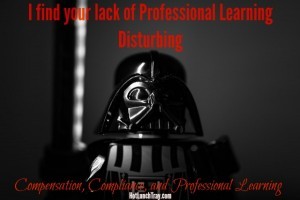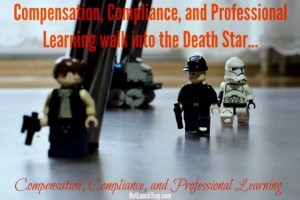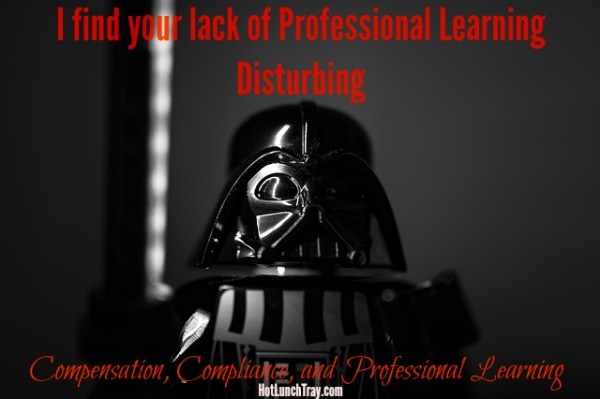Often in Education Compensation, Compliance, and Professional Learning all look similar from outside education.
But every once in a while some daylight surfaces between these categories and something rises to the surface as different-even exciting. And it isn’t compliance or compensation hoop-jumping.
It is exciting to think about professional learning independent of compliance or compensation since it improves education overall and the craft of the individual educator.
 Why separate these?
Why separate these?
Compliance training is often tied to laws or policies which are not entirely education oriented. Compliance is still an important facet to what educators do daily. Mandatory reporting and administration of requirements for special education students in not incongruent with the ideals of educators. However, the difference between learning about the details of policy are not the same as internalizing Professional Learning.
Compensation is limited in education, so attempts to steer professional Learning via compensation need to be scaled back and rarely offer sufficient time to accomplish the level of buy-in beyond the amount of funding. Unfunded mandates which result in compliance-driven activities sometimes are viewed by educators in direct competition to time desired to pursue professional learning. Compensation and Compliance activities can be poisoned by the resources they rob from Professional Learning.
Isolate Professional Learning
How to Professionally Learn
Professional Learning requires different conditions than Compliance and also needs to be treated different from Compensated work. Within Professional Learning teachers must curiously learn; must be open to learning something they do not already know. That condition is not always present in Compensation or Compliance models.
What educators have to learn is never complete and there is not one right way to do things. Therefore educators must remain open to new ides, new ways to accomplish what is not formulaic, but more an art form of educating the parade of ever-changing students in their school.
Choices
Choices in Professional Learning, independent of attempts to guide educators choices via compensation and/or compliance, can assist educators in finding their passion. Just because an educator holds a certain degree or has been teaching a subject or grade level does not always indicate their passion. An identified passion can help move people into their maximized positions to move a school, grade level, or classroom forward. Leaders can observe where each teacher is strongest and shift personnel accordingly ideally.
Movements such as EdCamp attempt to not only offer choice to educators seeking Professional Learning opportunities, but introduce them to the experience of engagement in learning that might not be delivered via Compensation or Compliance models in his/her professional past..
True Professional Learning can move the educator into a state of what Mihaly Csikszentmihalyi calls Flow. Flow is a sense of fulfillment that money cannot buy. Flow is often associated with sports. Sometimes this is the only exposure to flow and you might have heard it described as “in the zone” or “playing over your head.” But that feeling, that elevated state can be enjoyed in pursuit of furthering Professional Learning.
Maybe you can’t play over your head at all. Maybe it’s just potential you never knew you had.
Separating Compensation, Compliance, and Professional Learning would greatly increase the level of Professional Learning by educators. These portions of an educator’s job look more similar from the outside than they really are.






1 Pingback